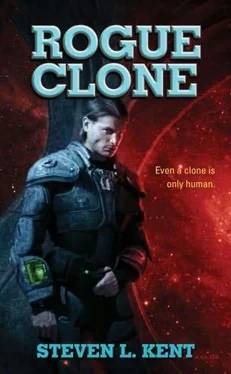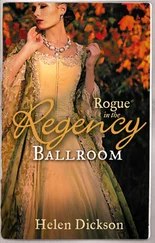Steven Kent - Rogue Clone
Здесь есть возможность читать онлайн «Steven Kent - Rogue Clone» весь текст электронной книги совершенно бесплатно (целиком полную версию без сокращений). В некоторых случаях можно слушать аудио, скачать через торрент в формате fb2 и присутствует краткое содержание. Жанр: Боевая фантастика, на английском языке. Описание произведения, (предисловие) а так же отзывы посетителей доступны на портале библиотеки ЛибКат.
- Название:Rogue Clone
- Автор:
- Жанр:
- Год:неизвестен
- ISBN:нет данных
- Рейтинг книги:3 / 5. Голосов: 1
-
Избранное:Добавить в избранное
- Отзывы:
-
Ваша оценка:
- 60
- 1
- 2
- 3
- 4
- 5
Rogue Clone: краткое содержание, описание и аннотация
Предлагаем к чтению аннотацию, описание, краткое содержание или предисловие (зависит от того, что написал сам автор книги «Rogue Clone»). Если вы не нашли необходимую информацию о книге — напишите в комментариях, мы постараемся отыскать её.
Rogue Clone — читать онлайн бесплатно полную книгу (весь текст) целиком
Ниже представлен текст книги, разбитый по страницам. Система сохранения места последней прочитанной страницы, позволяет с удобством читать онлайн бесплатно книгу «Rogue Clone», без необходимости каждый раз заново искать на чём Вы остановились. Поставьте закладку, и сможете в любой момент перейти на страницу, на которой закончили чтение.
Интервал:
Закладка:
Wan light shown in through a window in the back wall and dissolved into the eerie blackness. My eyes could not adjust to such total darkness. The hangar was not only dark but silent. It was an auditory vacuum, devoid of so much as a cricket chirping, or a dripping faucet, or a breeze, or even a ticking clock.
Reaching a hand in front of my face to keep from smashing into something, I stumbled forward. I worried about tripping on a power cord or a toolbox, but the floor was clear. I imagined reaching out and finding something cold and dead, a victim of the invasion, but that did not happen. The only people in the spaceport during the attack were allowed to leave the planet unmolested.
I found the smooth, rounded, metal of a spaceship. It was almost too large a ship to be in this hangar. My Starliner was big by private ship standards, but it wasn’t as big as this ship. This ship was tall and bulky. Brushing my hand along its nearly vertical hull, I felt my way around the floor. I could not be sure in the dark, but I felt confident that I recognized this ship.
Once again I felt my way through the darkness, walking slowly and blindly, afraid that at any moment I might bump my head on a wing or shelf. Not far from the first ship, I found the edge of a diagonal wing belonging to a second ship. I followed that wing toward the front of the Starliner. Punching my security code into the pad, I unlocked the hatch.
Now I found myself on familiar ground. I flipped a switch and lights turned on around the cabin. The cabin was long and narrow, with white leather seats and surrounded by wood-paneled walls. From this angle, the cabin looked like a miniature movie theater fitted into a tube. Instead of a screen it had a cockpit.
I switched on the landing lights and had a look at the other ship. As I suspected, it was Freeman’s ship. He had come this far. I had not known whether or not he made it to Safe Harbor before the Confederate Navy destroyed the Broadcast Network. Freeman must not have realized that my Starliner was self-broadcasting or he would have taken it.
I slept in the Starliner that night. The chairs only reclined so far, but they were soft and comfortable.
Safe Harbor Spaceport was thirty miles out of town. At the first light of day, I stole a car from a parking lot outside the passenger terminal and began the trip into town. The highway was empty and still with forests lining one side of the road and open fields on the other. There were no cars along the road and no signs of people. Except for the occasional billboard or road sign, this might have been a natural path on an uninhabited planet.
Five miles down the road, however, I ran into the ruins of an armored column. Tanks, missile carriers, personnel carriers, jeeps …military vehicles of all makes lay burned and broken. Some were upside down, their wheels in the air.
When the enemy demolished this column, they destroyed the road as well. Ten- and twenty-foot trenches scarred the road. Rough craters pocked much of the landscape. One particularly large trough cut across a bend in the road and may well have extended beyond it. It looked like an enormous knife wound in the earth, and the exposed soil within that gouge was charred black.
Seeing no point in trying to drive any farther, I climbed out of my car and shouldered my gear. I was not the first person to park here. A civilian van was parked near the front of the convoy. Like me, somebody had stolen a vehicle and driven in as far as he could from the spaceport. I stole a luxury car. The other person had stolen a family van—a utilitarian vehicle with cargo space and headroom. It had to have been Freeman.
I went to have a closer look at a broken tank before starting the hiking portion of my trip to town. It was an Alsance-Blake, a make of tank generally used by the Army. The same powerful laser that gashed the ground hit the tank’s turret and melted it. Molten metal had poured down the side of the tank like wax flowing down the side of a candle. The soldiers inside this tank would have drowned in a bath of melted steel if they were not incinerated first.
A few days earlier, I would not have equated human lives with this destruction. Now I felt something akin to pity for the men who died here. They would have been clones, like me, but not like me as well. They would have been standard GI clones. They were not my kind, but not far from it.
I hopped a small gully the lasers had cut into the road and continued to the next vehicle, a truck that had been sheered in two. This was the work of a battleship. That was the strength of attacking with battleships. You could scour the planet from above the atmosphere, using laser cannons to destroy enemy emplacements that were so far away they could not return fire. At least thirty men had died on this truck. Corpses in battle gear, their skin charred and their lips and eyelids burned away, grinned down at me.
I heard the caw of birds in the distance. Whether or not the birds had already picked over this particular carrion, they were coming now. If any of these dead had moist flesh, the birds would peck at it and strip it away. That might be good. The air around these vehicles reeked of burned meat. I doubted anyone would come out to bury these poor bastards.
A few vehicles later, I came to a spot where an explosion had blown a twenty-foot hole in the road. The blast radius was thirty or forty feet long. Judging by the debris I saw around the hole, the laser had likely struck a missile truck, detonating its deadly munitions. Had that truck carried a nuclear payload, I would have been irradiated long before reaching the convoy. I might not have made it out of the spaceport alive.
A wonderful cooling breeze blew across this scene. The tops of the trees swayed in that breeze. The wind brushed across the velvety carpet of tall grass that stretched across the fields. Beyond the fields a blue lake twinkled in the bright morning sun. And ahead of me, the scorched supply line stretched on and on and vanished behind a hill. To the best of my reckoning, the column stretched on for another seven miles.
I did not make it all the way to Safe Harbor before nightfall. Crossing the gullies and blown out sections of road slowed me down. By late afternoon, I was only two or three miles from the outskirts of the city. I was close enough to see it clearly, but I did not want to travel into that urban tangle in the darkness. As the sun set and the sky took on streaks of amber, orange, and gold, I set up camp just inside the forest and ate an MRE that I had scrounged from the Starliner.
Once night fell, I hiked out of the woods to have a look at the distant city. No lights shined in the tall buildings. Some glow rose from the street. There might have been fires in dumpsters and trashcans. Maybe a few small stores had gone up in flames. The glow suggested controlled fires, but you never knew.
When morning came, I would make my way into the city. I would travel to Fort Washington, the stricken Marine base. I wanted combat armor. The sensors and lenses in a combat visor would help as I searched for Freeman and Callahan.
Resting in the woods, sleeping in the dark because I did not want to give away my position by building a fire, I thought about Safe Harbor, and Honolulu, and the Mars Spaceport, and the city they called Hinode on Ezer Kri. These had all been busy, thriving cities. I tried to imagine what it would be like to walk through these cities today, but the only image I could conjure was a spaceport terminal packed with millions of people fleeing their homes. I remembered frightened children and crying women and general silence.
In the morning, I ate another MRE and finished the hike into town.
CHAPTER FORTY-ONE
The last time I came into Safe Harbor, the city was empty but perfectly preserved, like a museum exhibit. Now it more truly fit the profile of a ghost town. Looters had gutted the small stores on the outskirts of town. Some buildings were burned down.
Читать дальшеИнтервал:
Закладка:
Похожие книги на «Rogue Clone»
Представляем Вашему вниманию похожие книги на «Rogue Clone» списком для выбора. Мы отобрали схожую по названию и смыслу литературу в надежде предоставить читателям больше вариантов отыскать новые, интересные, ещё непрочитанные произведения.
Обсуждение, отзывы о книге «Rogue Clone» и просто собственные мнения читателей. Оставьте ваши комментарии, напишите, что Вы думаете о произведении, его смысле или главных героях. Укажите что конкретно понравилось, а что нет, и почему Вы так считаете.












